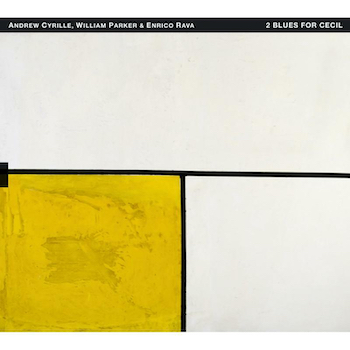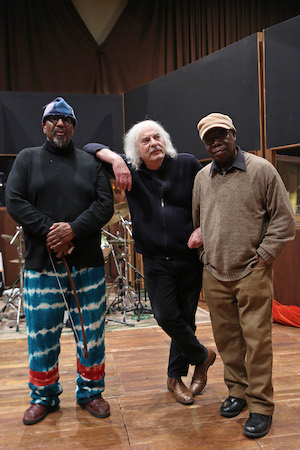Jazz Album Review: “2 Blues for Cecil” — Beautifully Out of the Box
By Michael Ullman
The trio shares Cecil Taylor’s love of rational freedom and adventure, but it doesn’t try to reproduce the pianist’s rip-roaring intensity.
Andrew Cyrille, William Parker & Enrico Rava, 2 Blues for Cecil (Tum Records)

Those familiar with the drumming of Andrew Cyrille, perhaps especially his solo records like What About?, will not be surprised that the first thing we hear on 2 Blues for Cecil is the sound of his brushes swishing across the skin of his snare drum. Cyrille is a master of sounds as well as rhythm. Now 82, he is still perhaps best known, as is bassist William Parker, for his long stint with the Cecil Taylor ensemble. Parker is the youngest of the group: he’s 69 and, after having made over a dozen records with Taylor, has been part of dozens more as a leader, including the recent Mayan Space Station. Another octogenarian bandleader, the Italian-born Enrico Rava, plays flugelhorn (exclusively) on 2 Blues for Cecil, a session dedicated to Cecil Taylor.
The trio shares Taylor’s love of rational freedom and adventure, but it doesn’t try to reproduce the pianist’s rip-roaring intensity. 2 Blues for Cecil is a genial set, its silences as intriguing as its flurries of notes. There are a number of lovely improvised melodies — sprightly, clever, and even transparent interactions. After Cyrille’s first brush strokes on the opener, “Improvisation No.1,” comes some dark, tuneless rumbling on the bass and breathy sounds from Rava. Then the flugelhorn introduces a simple phrase which Rava then elaborates, stopping to listen to Parker, who plays a lively rhythmic figure that the horn immediately picks up on. The group improvisation moves on from there, inspired by ideas provided by both players. Later, as Cyrille and Parker heat up, Rava relaxes with long tones. One can almost feel him listening to the others and reacting in unexpected ways.

William Parker, Enrico Rava and Andrew Cyrille. Photo: Luciano Rossetti © Phocus Agency.
The session is beautifully recorded. Cyrille’s drums set is spread out over the sound stage: Parker and Rava seem to be nestled in a bed of percussion. Even the titles intrigue: “Ballerina” is a fast, light-footed production, reminding this listener that Parker’s wife is a dancer; “Machu Picchu” begins with a kind of swagger in the bass. “Enrava Melody” is named for the flugelhornist, who to starts it off with some solo phrases, stops for Parker to interject his own counter-themes, and then proceeds to his next related idea. Eventually Cyrille comes in by himself and the trio moves ahead at a mid tempo with increasing excitement.
The two blues on the recording are particularly amusing. There are no far out chords on “Blues for Cecil No.2,” on which Parker lays out the basic chords of the 12 bar blues. If anything, he emphasizes his warmhearted (temporary) conservatism by at times playing the tonic note on all four beats. He’s keeping time without worrying about walking anywhere. Rava turns out to be a fine blues player, and Parker’s choruses over Cyrille’s tapping accompaniment are treasures. The set ends with another surprise: a version of “My Funny Valentine,” a favorite choice of Miles Davis. The trio supplies a sober rendition, which begins with a recurrence of the brushes that opened the disc. Rava doesn’t imitate Davis’ choked sounds, yet the ample space he leaves between phrases is perhaps a kind of tribute to the departed trumpet player. Parker once said about Cecil Taylor: “He was not avant-garde; he was a human being who loves life as music. He would not be boxed in.” One of the trio’s numbers is “Top, Bottom and What’s in the Middle.” In this paradoxical session, the players are independent, out of the box. Yet they also sound beautifully together.
Michael Ullman studied classical clarinet and was educated at Harvard, the University of Chicago, and the U. of Michigan, from which he received a PhD in English. The author or co-author of two books on jazz, he has written on jazz and classical music for the Atlantic Monthly, New Republic, High Fidelity, Stereophile, Boston Phoenix, Boston Globe, and other venues. His articles on Dickens, Joyce, Kipling, and others have appeared in academic journals. For over 20 years, he has written a bi-monthly jazz column for Fanfare Magazine, for which he also reviews classical music. At Tufts University, he teaches mostly modernist writers in the English Department and jazz and blues history in the Music Department. He plays piano badly.
Tagged: 2 Blues for Cecil, Andrew Cyrille, Enrico Rava, Michael Ullman, Tum Records

Listening to “Ill Take Romance” now, lovely stuff!